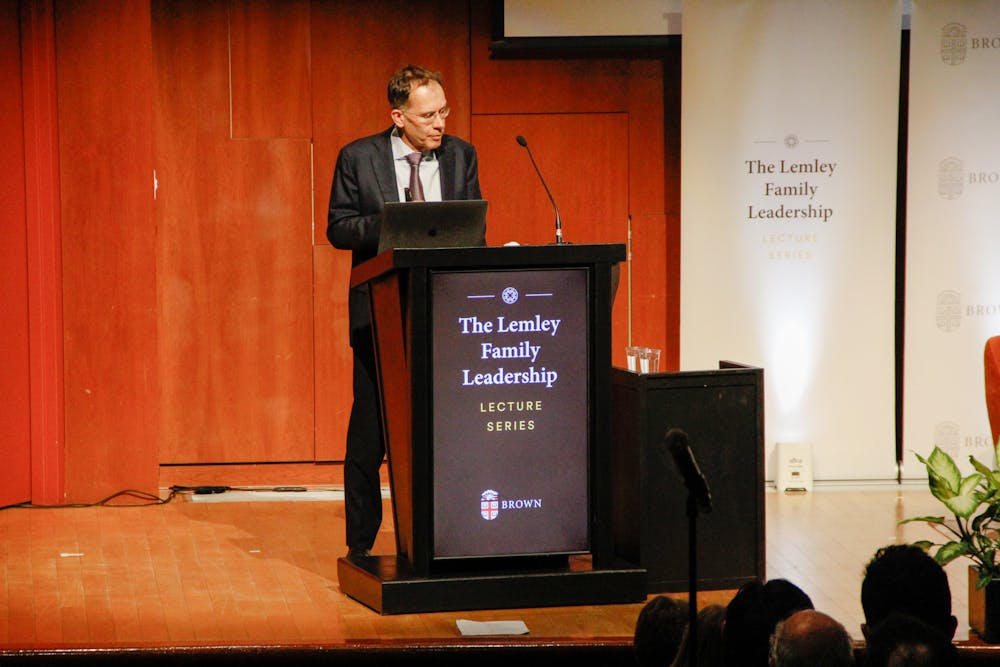Students, parents and University faculty crowded into the Salomon Center on Wednesday to listen to a lecture from the 2021 Co-recipient of the Nobel Memorial Prize in Economic Sciences Guido Imbens MA’89 PhD’91.
Imbens won the prize for his work with Massachusetts Institute of Technology economist Joshua Angrist on “methodological contributions to the analysis of causal relationships.” He was chosen as the speaker for this semester’s Lemley Lecture, which invites “exceptional leaders who are preeminent in their field” to the University.
According to Imbens’s biography provided by the University, he studies “particular methods for drawing causal inferences from experimental and observational data.”
He has been published in numerous prominent economics and statistical journals and, with Harvard Emeritus Professor of Statistics Donald Rubin, published a book, “Causal Inference in Statistics, Social and Biomedical Sciences.”
Imbens, who is a professor of economics and applied econometrics at Stanford Graduate School of Business, reflected on his experiences and work during the lecture, which was hosted and moderated by Provost Richard M. Locke P’18.
Opening with a joke about the surprisingly large crowd drawn to a lecture on econometrics, Imbens reflected on his personal background. He grew up in the Netherlands and was inspired to study econometrics after being introduced to the work of economist Nikolaas Tinbergen while at school.
Discussing his studies in the Netherlands and England, Imbens recalled that he wasn’t taught real-world applications for his academic studies. “I didn’t really know what bonds were,” he said of his macroeconomics course experience to the amusement of the audience. “I started asking around and it turned out that actually nobody in my classes knew what bonds were.”
Imbens then followed his mentor, Anthony Lancaster, to study at the University, where he received a master’s and doctorate in economics in 1989 and 1991, respectively.
The University exposed him to real-world perspectives that coincided with his economics studies, he said, making his work “more well-rounded.” He also remembered attending a Thanksgiving dinner for foreign graduate students hosted by the then-chair of the economics department, a tradition Imbens now continues at Stanford University.
Moving into his work on causal inference, Imbens explained that correlation is not causality, using the example that a rooster crowing doesn’t cause the sun to rise. Instead, a causal inference could be the effect of universal basic income on labor supply or the effect of vaccines on COVID-19. Following a quip about receiving a Nobel Prize for “casual relationships” after stressing how often his work is incorrectly spelled, he further clarified that a causal inference translates to a change in the value of one variable in response to another variable.
Imbens outlined four critical concepts related to causal inference: Manipulation, the use of multiple units, paying attention to attributes and questioning how units are assigned their experimental treatments.
He went on to explain that econometrics has historically fallen into two schools: numbers-heavy “chance” statistical traditions that rely on randomized experiments or more qualitative “choice” social sciences that focus on observational studies.
While academics and policymakers have historically considered the statistical tradition to be the gold standard, Imbens noted that the branch of experiments isn’t always feasible for financial or ethical reasons.
The social science branch of econometrics, Imbens noted, centers around observational data and consequently has less experimentation. But it also permits the study of more “abstract” ideas, such as the impact of college education on earnings, without requiring that test subjects be forced to forgo college in the name of experimental data.
Imbens then mentioned famed economist A.W. Phillips’s work in the branch constructing complex models that aimed to capture the behavior of economic agents, such as consumers. Similar models came to dominate econometrics and encouraged the creation of increasingly complicated models that were “disconnected from statistics literature,” Imbens said.
Commenting on the later “credibility crisis” that peaked in the 1980s as a result of many mathematical models failing in their real-world applicability, Imbens stressed the importance of the limitations of models and experimentation.
The two traditions eventually came together to employ natural experiments with improved credibility.
Transitioning out of his historical overview of the field, Imbens described different examples of causal inference experiments, discussing topics from the effect of military service on earnings to the prediction of consumer behavior in New York City’s Fulton Fish Market.
Imbens ended his lecture by noting that causality is central to policymaking. He also promoted the role of experiments in inferring causal effects, but added that such experiments aren’t always possible. Finally, he said that observational studies are incredibly valuable but require high levels of credibility.
During the question and answer portion of the event, Imbens said that he was fascinated by “trying to find ways to combine” the experimental study and observational study portions of the field along with “designing experiments in more complex settings.”
Asked about artificial intelligence, Imbens commented that it has helped immensely in improving “predictive methods.” But he added that it has also created challenges with “adapting” and “harnessing the power in the metrics to look at causal effects.”
Imbens also urged economists to “make clear to policymakers what the implications of their work are” in response to a question about how researchers can communicate their findings more effectively to the broader public.
Edwin Chan ’23 said he attended the lecture because he’s “quite interested in the study of econometrics” and saw that Imbens is “a Nobel Prize winner.”
Fred Sloneker, a parent of an incoming student who studied economics, said that he “wanted to hear where econometrics was right now.” Based on Imbens’ lecture, he felt that “econometrics has changed a great deal since the thirty years (from) when I studied it.”
Jack Tajmajer was a Metro editor at The Herald.





